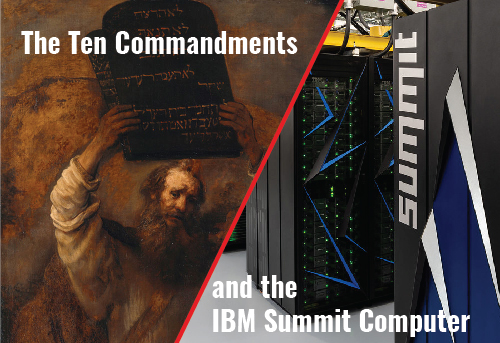
How to have a Bigger Brain Using Technology
| By Jack Speer | June 18, 2019 |
I think everyone grapples with managing our day with the volume of information we process. I think all of us live in a perpetual state of being overwhelmed with the technology we’re learning to manage our work and lives.
Moses and the IBM Summit Computer
We are at a period of huge inflection as a race of people.
Growing up in a religious tradition in small town, Tomball, Texas, I learned that God gave Moses just Ten Commandments in only about 70 words–a grand summary of how people ought to live. It was concise. It all fit onto two tablets of stone that the children of Israel could carry with them in the mysterious Ark of the Covenant on their journey to the Promised Land.
Granted that in our small town we weren’t that far ahead of Moses. Yet in the span of the last 30 years our lives have been transformed beyond what science fiction could have imagined. We live in a world where knowledge doubles every 13 months and the amount of information generated in a single second far exceeds the capacity of one human brain to process it.
The IBM Summit Computer, fastest and smartest in the world, occupies floor space equivalent to two tennis courts and can do 200 quadrillion calculations per second. It requires 136 miles of cabling and 2,200 gallons of water per minute to keep it cool. The Summit Computer deals with artificial intelligence (AI) which will again change the course of human history.
And we’re only at the beginning.
From Big Data to Little Me – How I Use Technology
Big data is changing the world from banking to sales, from inventory to astronomy, but the world of the IBM Summit Computer is as far away from me personally as a distant galaxy.
In the 21st Century we have to give up a lot of assumptions that people thought were fundamental for the last thousand years. These assumptions are not true anymore. I want to talk about the big changes and hard choice that we need to make to navigate the world we live in.
- The Filing Cabinet is Gone Forever–So Give it to Goodwill! Forget the old saying, “A place for everything and everything in its place.” That’s not true anymore. We used to put information into filing cabinets in a filing room at the office. Today information is dispersed globally online or in the cloud and must be retrieved from a million locations. It’s not in your desk or in the next room. Our job is to organize the flow and find one screen to retrieve, display, and use it.One way to do that is with OneNote. There are undoubtedly products that are as effective, or perhaps even better, and if you’re using one, don’t leave it. But OneNote has finally eliminated to a great extent the question, “Where did I put that article, that important document, my meeting notes, my project strategy?” It is all in OneNote, and if you’re not using it or a similar product, it will revolutionize your life by providing access to notebooks where you will easily find everything you may have spent a lifetime looking for.
- Email is Killing Us and so are Team Apps–Focus on Effective Communication. I don’t know anyone who isn’t buried in the avalanche of 205 billion emails sent each day around the world–and most of them come to my inbox. 🙂 Many of those emails I work to delete, sort, answer, forward, or ignore–or desperately search for when someone asks if I read the email they sent.We don’t know who to include on the string and I’m getting 10 emails a day from projects I haven’t been involved in for 6 months. There are dozens of team apps that eliminate the need to figure out who to send the email to. It’s my responsibility to check the app to see what’s going on.Apps can be an improvement, but we’re seeing that they encourage people to post more often and longer posts. We need to tell people to be brief. Also, we’re suffering from the “app of the week” syndrome. I was working on a project with a team with Basecamp, and now no one even knows what that is.Everyone is an evangelist for their app and it become the war of competing technical sects–mine is the only true app. There is huge learning curve involved in a new app, and usually the advantages are minimal. I’m saying to our team, choose the collaboration app you want to use, because we’re not going to change from that system until you prove you have something a lot better.Here are communication survival rules:
- Be brief–a one word answer is better than two.
- Don’t go radio silent–if I contact you, it’s because I need an answer. If you don’t take me seriously enough to answer me, that’s OK, but I’m moving on to someone else I can get answers from.
- Don’t Hop on the Plane–Do video Conferencing. You can do business at the highest levels now with videoconferencing without sacrificing important relationship time. We are finding that few people want to get on the airplane now.Even very high level deals are connected through teleconferencing apps like Zoom, which again, is what everyone seems to be gravitating towards. You can share documents, it’s reasonably intuitive and easy to use. One again, I am going to be a hard sell to change from Zoom. In six months someone will tell me Zoom is out and the new app is in. Consider the cost in time and real dollars to make these changes.
- Save Time–Ditch Social Media that is Useless. Social media increases our reach globally, and I’ve developed great friends I’ll probably never meet in person. Having said that, if you still need to close a deal or find a job, take a serious look at the time and energy you’re using on social media. I used to feel really guilty that I wasn’t as active as I “should be” on social media, but I have found that there are, for me, quicker ways to form valuable and satisfying relationships.
Learn What to Drop!
So here is my take on where you can save time, energy and focus.
LinkedIn is Useful but Disappointing. LinkedIn’s main reason for existence is it is a giant business directory. I have several thousand connections whom I know little about, can’t connect effectively, and a bunch of people who use it to spam me. Almost everyone who wants to connect with me is in sales, not management. LinkedIn could be incredibly valuable if I could really address my connections in mass, rather than one by one. It needs to be reinvented. They have great blogs, but no way can I get to them with the time I have.
YouTube–Use it to Learn and be Entertained. It’s one of the most useful tools in the world. 5 billion YouTube Videos are uploaded every day and 300 hours of video are uploaded to YouTube every minute! You can teach yourself anything from cooking to meditation. It can quickly substitute for traditional TV.
Forget Twitter. Forget Twitter if you’re not now using it or enjoying it now. It’s like going to a party where there are millions of really boring people. Contrary to what people say, rarely does anyone ever say anything clever on Twitter.
I have the app on my mobile and read a few Tweets each week, but I quickly lose interest. It’s like a frat party where you’re trying to get the Big Tweeters to pay attention to you. Unless you’re a national figure who wants name recognition, I think it’s a huge and boring waste of time.
Thumbs up to Facebook. I hope it stays around in its present form. It connects me with colleagues, family and friends I truly enjoy. I don’t know how anyone could let themselves be taken in by bogus Facebook postings.
Instagram?! You’ve got to be kidding! Interaction is based on communication, and a picture is not worth a thousand words when you can communicate as the only animals on the planet with the gift of speech.
Websites are Still a Goldmine–they give you the total picture. Many people think they’re making the best use of websites. Use Websites to put opportunity in your path. In the last few years, a website as a destination has become less important as people search for smaller slicers of information. As a result, many people don’t really know how you use a website to gain personal leverage over situations.
Websites need to be seen as the total portrayal of organizations you need to know. If you’re working to get a new position or sell a customer, knowing a website in depth is worth your time. If you really study the website, your competitors won’t bother to do this, and you’ll be significantly ahead.
Technology Can Help You Become a Interesting Person. I’m always amazed that many people I meet have access to all known knowledge–but actually know very little. Young Abraham Lincoln, ready books by the light of the fireplace, knew more factual knowledge than many people do today.
Although you can know anything now that’s knowable, many people are all too often more shallow than previous generations. The best way to generate a billion views is to find a really cute kitten and post it on the Internet–not so much interest in current affairs, science, and history.
I am a huge listener to podcasts. I’m always looking for interesting stories, funny accounts, and interesting ideas that I put into my writing and daily conversations.
A 30-day Fast Away from Technology?! I Really Don’t Think You Want to Do that
Technology is an integral part of our ability to live and perform in the world at the level demanded of people today. People really agonize over whether technology is too all consuming for people and families, especially children. I even have an app on my iPhone, which I never pay any attention to, that tracks my “facetime,” the length of time I’m looking at my handheld.
I fully realize the dangerous side effects of technology–but those dangers have always existed with the introduction of new technology. The discovery of electricity meant danger from electrocution. The invention of the automobile brought traffic deaths. I think we’re facing the same thing with information technology of today.
You can become obsessed and view the wrong things online. At the same time, technology is a part of human functionality today. Kevin Kelly, in his book, What Technology Wants, calls it the technium, the additional mental and physical advantages that technology brings us, making technology an extension of our very being.
The addition of technology, with the ability to retrieve any needed information instantly, adds to your IQ. I would just as soon scrape a few centimeters off my brain as give up the artificial intelligence we all carry around in our pockets. We need to use technology well and guard against its dangers.






